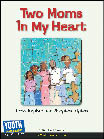 |
Edited by Al Desetta
Youth Communication
123 pages. $12 paperback
Placed in foster care at age 2, Lishoné Bowsky hardly knows her birth mother Betty, whom she hasn’t seen since age 7, when she was adopted. Betty promised to see her soon. Unable to let herself trust her adoptive parents, Lishoné ran away at 14. As she writes her story at 19, she still dreams of finding Betty. In another story, written at 23, she has found Betty – but not her dream.
Such dreams infuse the heartfelt testimonies in this anthology from the New York City nonprofit teen writing program that produces Represent, the magazine by and for youth in foster care, where these 18 stories were originally published between 1993 and 2008.
Dominick Freeman, who never knew his father, fantasizes a “dream dad” while enduring mistreatment in six foster placements from age 6 to 15. At last, during his summer job in a hospital, Dominick’s supportive boss Richard, a psychiatrist, offers to adopt him. Dominick never visualized his dream dad as gay.
LeFonché Rawls was taught by her mother to distrust white people. At 13, after spending two years enjoying the kindness of her white foster mother Alicia, she agrees to adoption. When her birth mother refuses to permit the adoption, LeFonché is devastated. At 17, she writes, “If our biological parents aren’t doing right by us, then we should have the right to say who we want to be with.”
Four young writers investigate results of the 1997 Adoption and Safe Families Act, which increased older adolescent adoptions from foster care. Only half of such adoptions are successful. Two interviews with experts on post-adoption counseling clarify common difficulties experienced by adolescents who have been forced to wait so long. Debbie Riley of the Center for Adoption Support and Education (CASE) identifies unresolved grief and loss, traumas resulting from abuse and neglect, and trouble building trust – all issues that pervade this book’s personal accounts. Two older teens explain why they turned down offers of adoption, choosing independent living instead.
The perspectives of three parents are also included: a woman who gave birth to and reared four children but learned new parenting skills when rearing eight adopted foster children; a parent advocate who adopted her daughter’s children; and a woman who recalls the difficulty of giving up her baby for adoption when she was 14.
The book closes with tips on how teens can use these true, honest stories for self-help and improving their own writing and reading skills. Staff training suggestions and discussion questions for teen groups make this thought-provoking anthology a useful tool in many settings. (212) 279-0708, ext. 115, http://www.youthcomm.org.
























